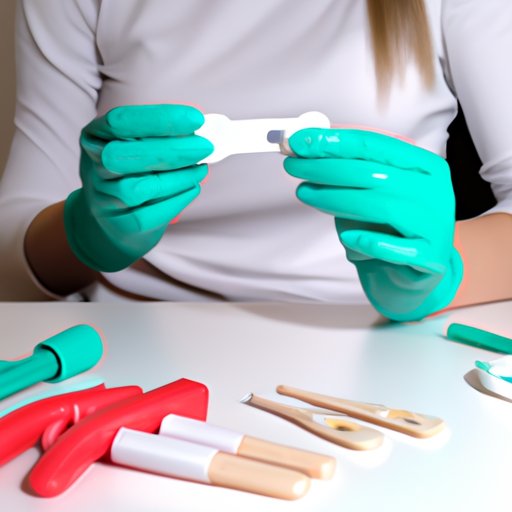
I. Introduction
Clostridioides difficile, or c diff for short, is a bacterial infection that causes inflammation of the colon and can lead to severe symptoms such as diarrhea, fever, and dehydration. For those who have contracted this disease, recovery can be challenging. As a patient or caregiver, it can be difficult to tell whether you are making progress in the healing process or if the illness is getting worse. In this article, we will explore how to tell if c diff is getting better and provide guidance on monitoring symptoms, testing, treatment options, prevention strategies, and personal stories to increase reader engagement.
II. Discussing the Symptoms of C Diff
The symptoms of c diff are often severe and should be monitored closely to assess the progression of the disease. Some common symptoms include:
- Watery diarrhea (at least three bowel movements per day for two or more days)
- Abdominal cramping and pain
- Fever
- Nausea and loss of appetite
- Dehydration (dizziness, dry mouth, dry skin, and decreased urine output)
If you or someone you know is suffering from c diff, it’s essential to monitor these symptoms regularly. While everyone’s recovery will differ, there are some improvements that you may see that can be a sign of recovery. These can include:
- Decreased frequency of diarrhea
- Improved consistency of stool
- Less abdominal pain
- Improvement in dehydration symptoms
III. Testing for C Diff
There are several tests that can be used to diagnose and monitor c diff, each with different accuracy levels. These tests include:
- Stool tests: This involves analyzing a stool sample to detect the presence of c diff toxins. This is the most common test used.
- Blood tests: Testing the blood for elevated white blood cell counts, which are often associated with c diff infection.
- Imaging studies: These may be used in severe cases to detect complications such as perforation of the colon.
If your doctor orders a test, it’s crucial to understand what the results mean. For example, a stool test could detect the presence of c diff toxins that might not cause symptoms. It’s always best to discuss your individual results with a medical professional to determine how to best proceed.
IV. Discussing Treatment Options
There are various treatments available for c diff, including antibiotics and other medications like vancomycin and fidaxomicin. These drugs generally target the bacterial infection and seek to reduce the symptoms present. However, medication efficacy can vary, and it may take time to see improvements. Supportive therapies such as hydration and electrolyte replacement may also be recommended to help manage symptoms.
It’s essential to follow a prescribed treatment course and not to stop or alter medications without consulting a healthcare provider. The overuse and misuse of antibiotics can lead to antibiotic resistance, making future treatments increasingly difficult, so care should be taken.
V. Highlighting Preventative Measures
Preventing c diff infection is always better than treating it. Prevention measures can include:
- Practicing good hand hygiene with soap and water (or alcohol-based sanitizers)
- Disinfecting surfaces with a bleach solution
- Wearing disposable gloves when in contact with bodily fluids
- Avoid touching your face to reduce the spread of germs
- Isolating patients with active c diff infection
- Reducing the use of antibiotics whenever possible
If you have suffered from c diff in the past, it’s especially important to be vigilant about preventing future outbreaks.
VI. Sharing Personal Stories or Experiences
Personal stories and experiences can provide valuable insights into the lived experiences of those who have battled c diff.
For example, one patient, John Smith, described his experience with c diff. “I suffered from this disease for three months, and I thought it was never going to end. It was debilitating, and I felt like I couldn’t do anything. But after completing my treatment, I noticed a significant improvement in my symptoms. I’m hopeful that I’m on the road to a full recovery.”
VII. Conclusion
If you’re struggling with c diff or caring for someone who is, it’s essential to seek medical attention and adhere to treatment plans. While it can be challenging to tell whether you’re improving, monitoring your symptoms, understanding test results, and practicing preventative measures can all help. Ultimately, recovery from c diff is possible with proper care and attention.




